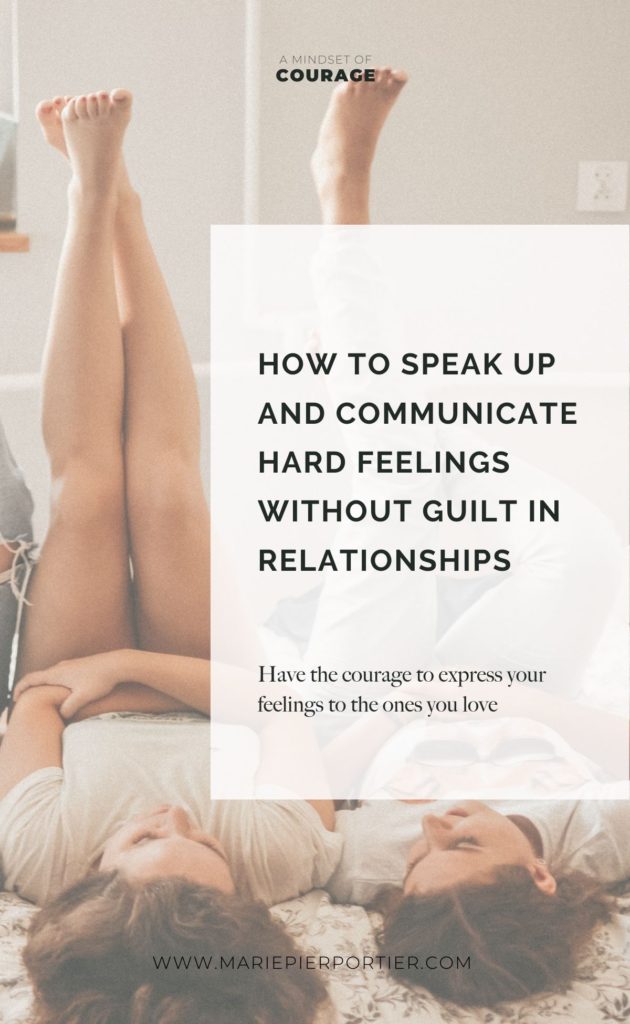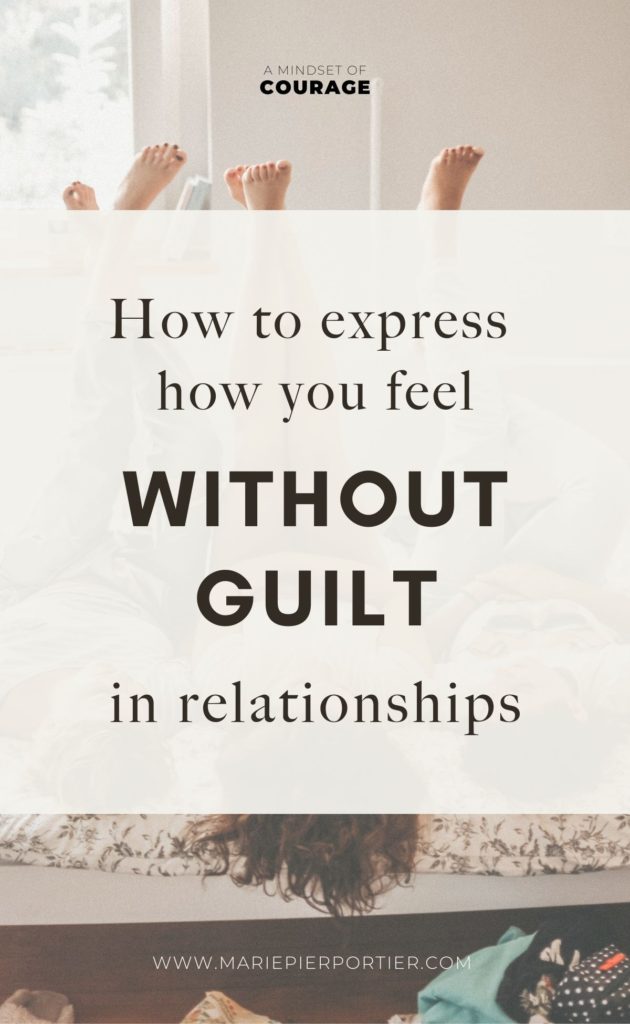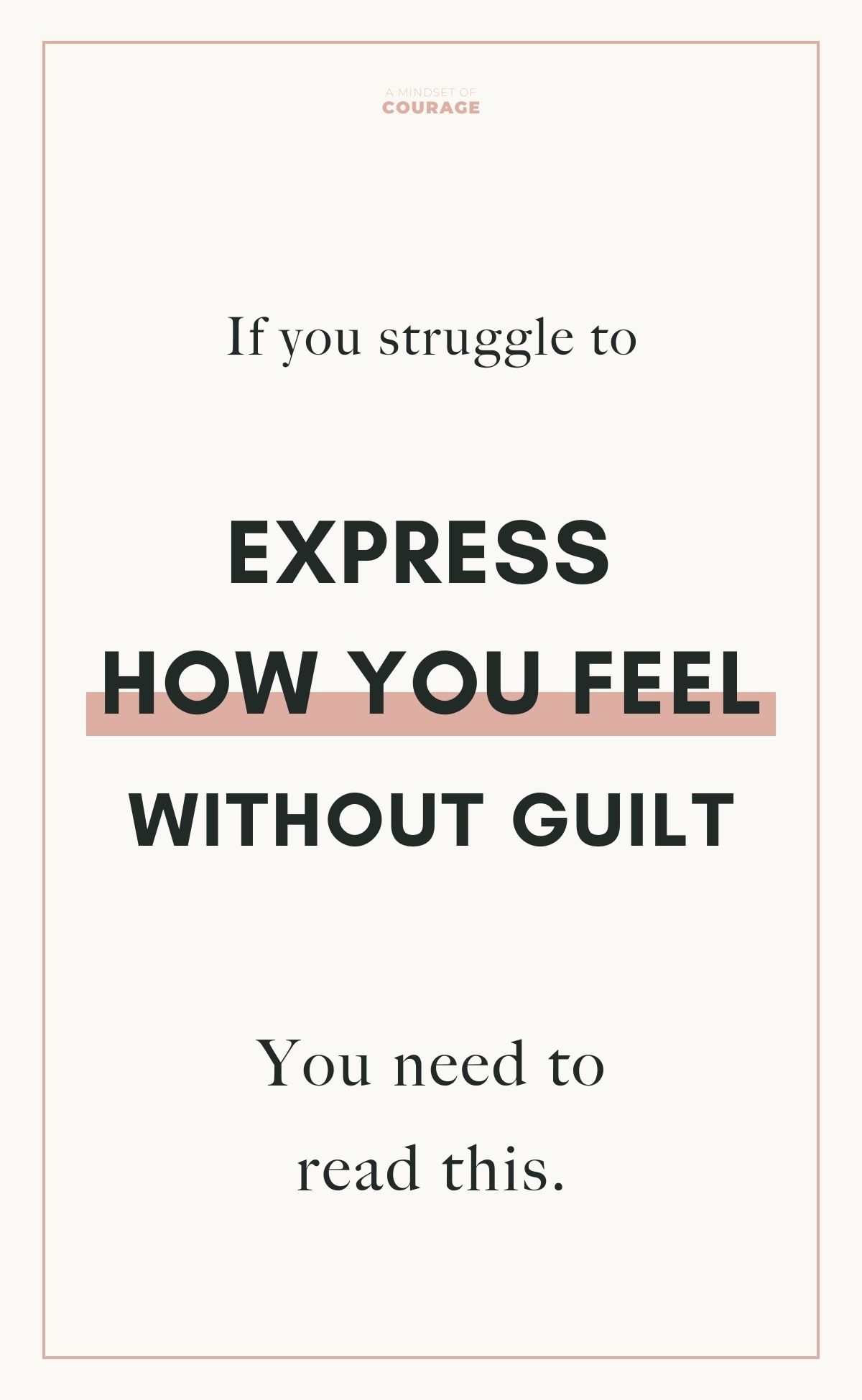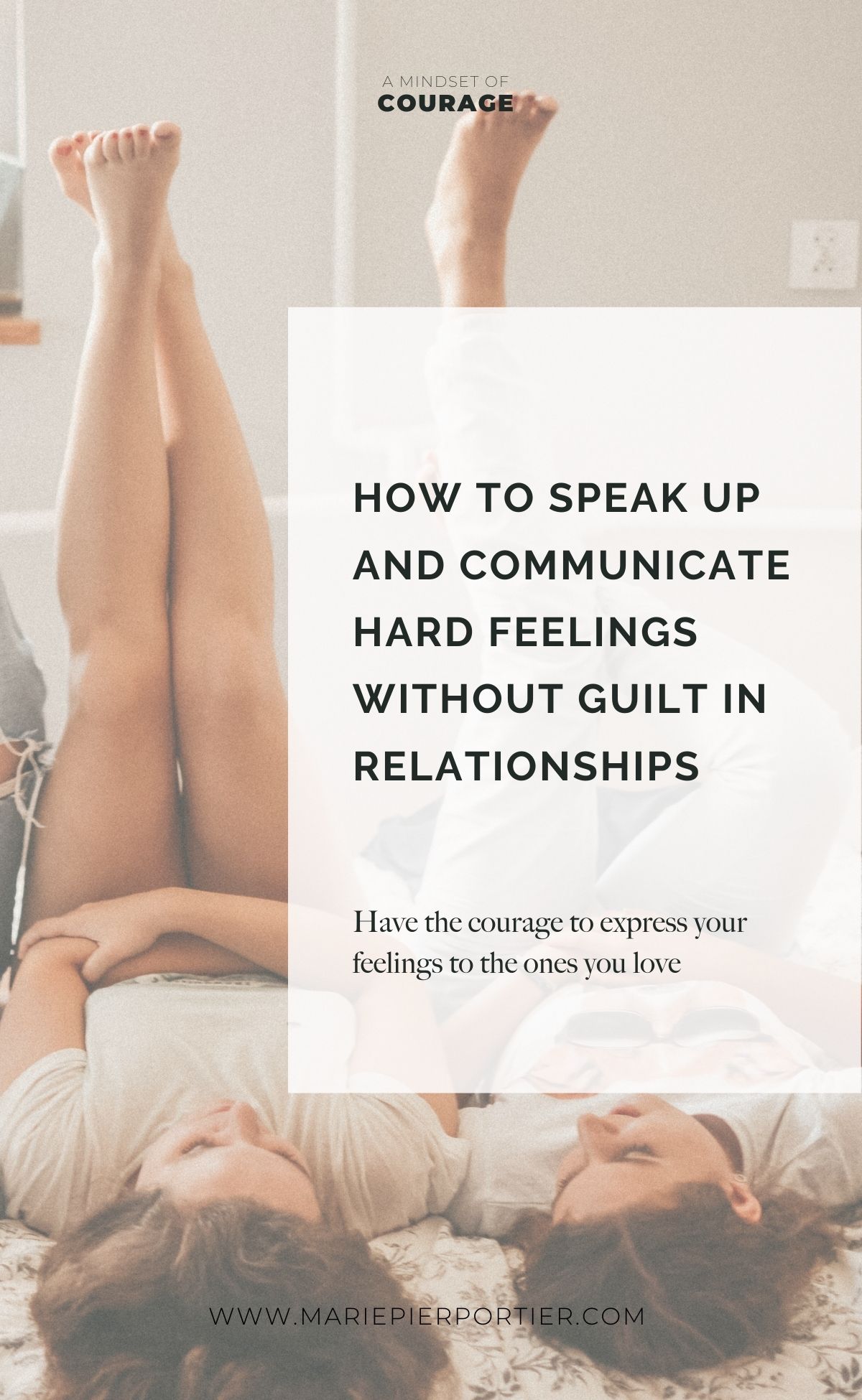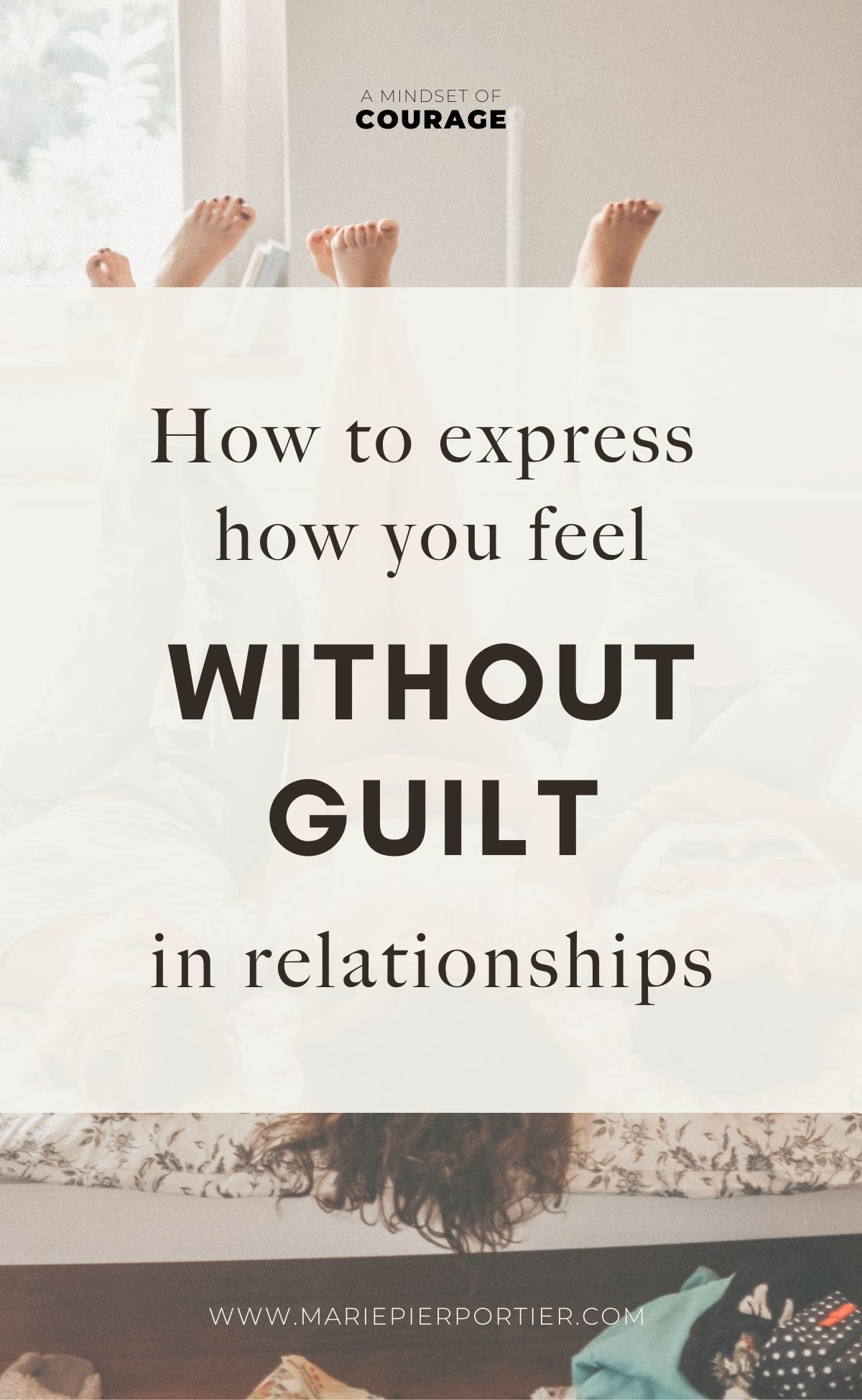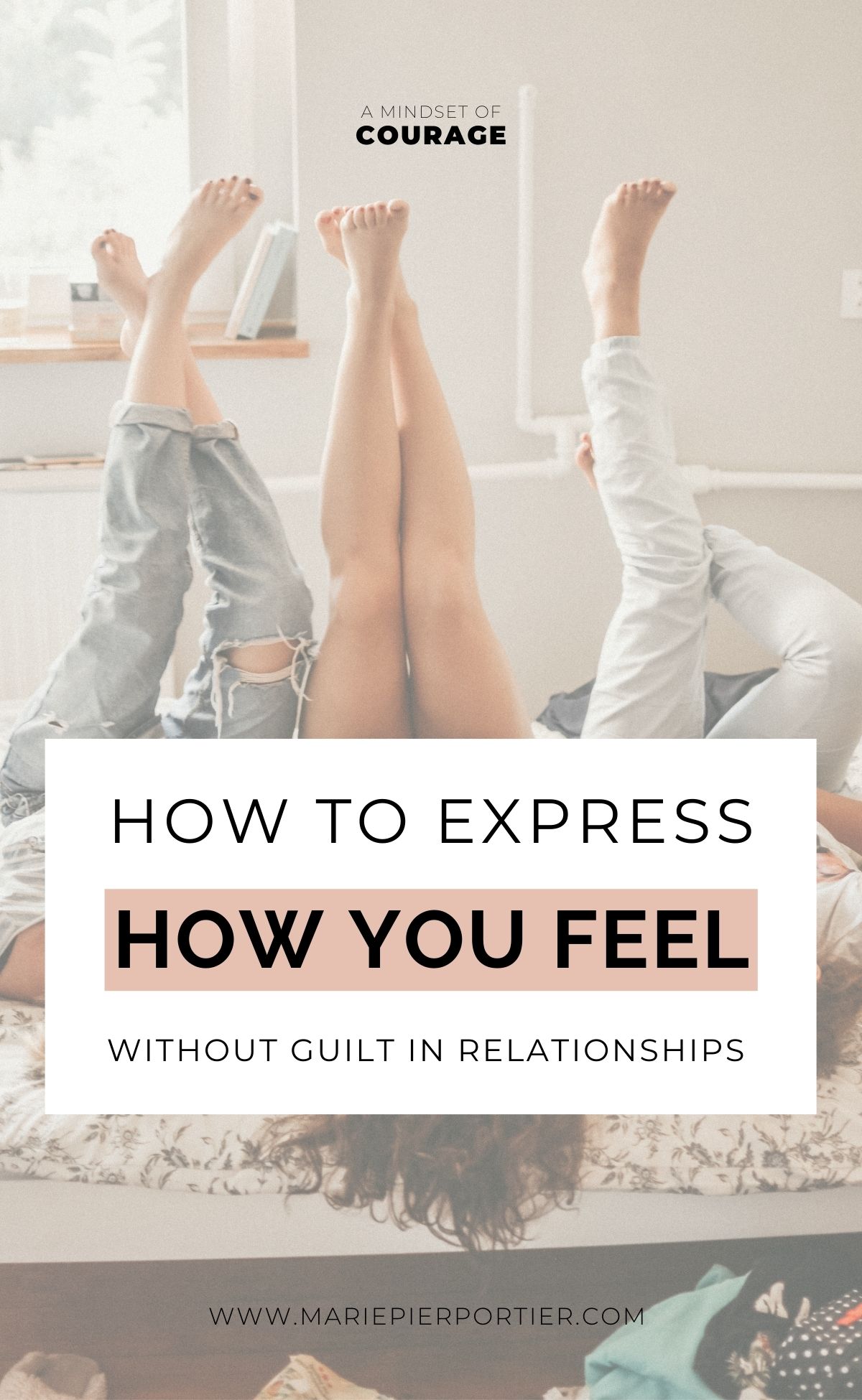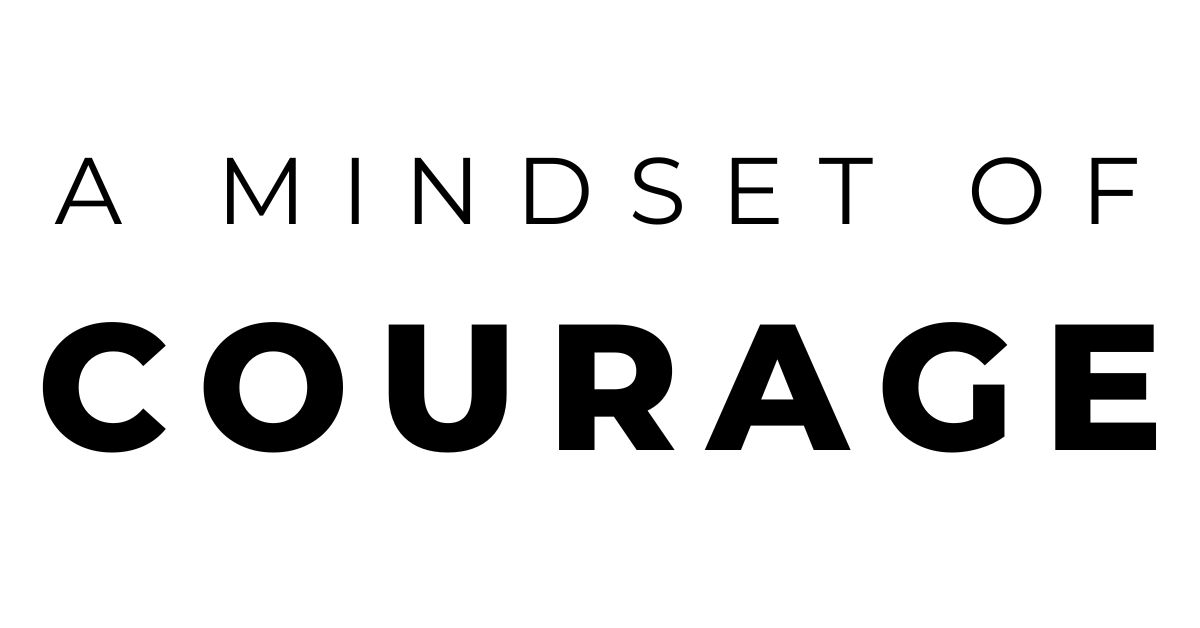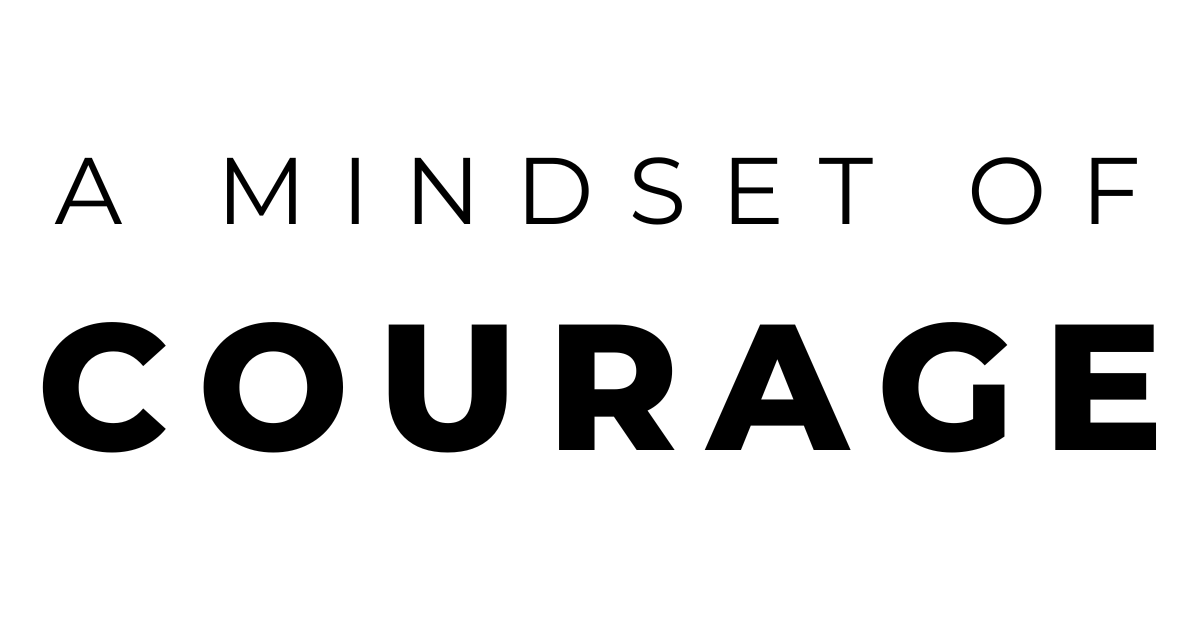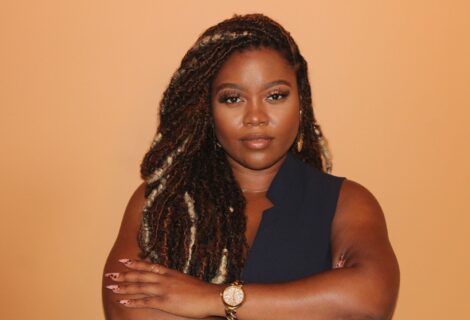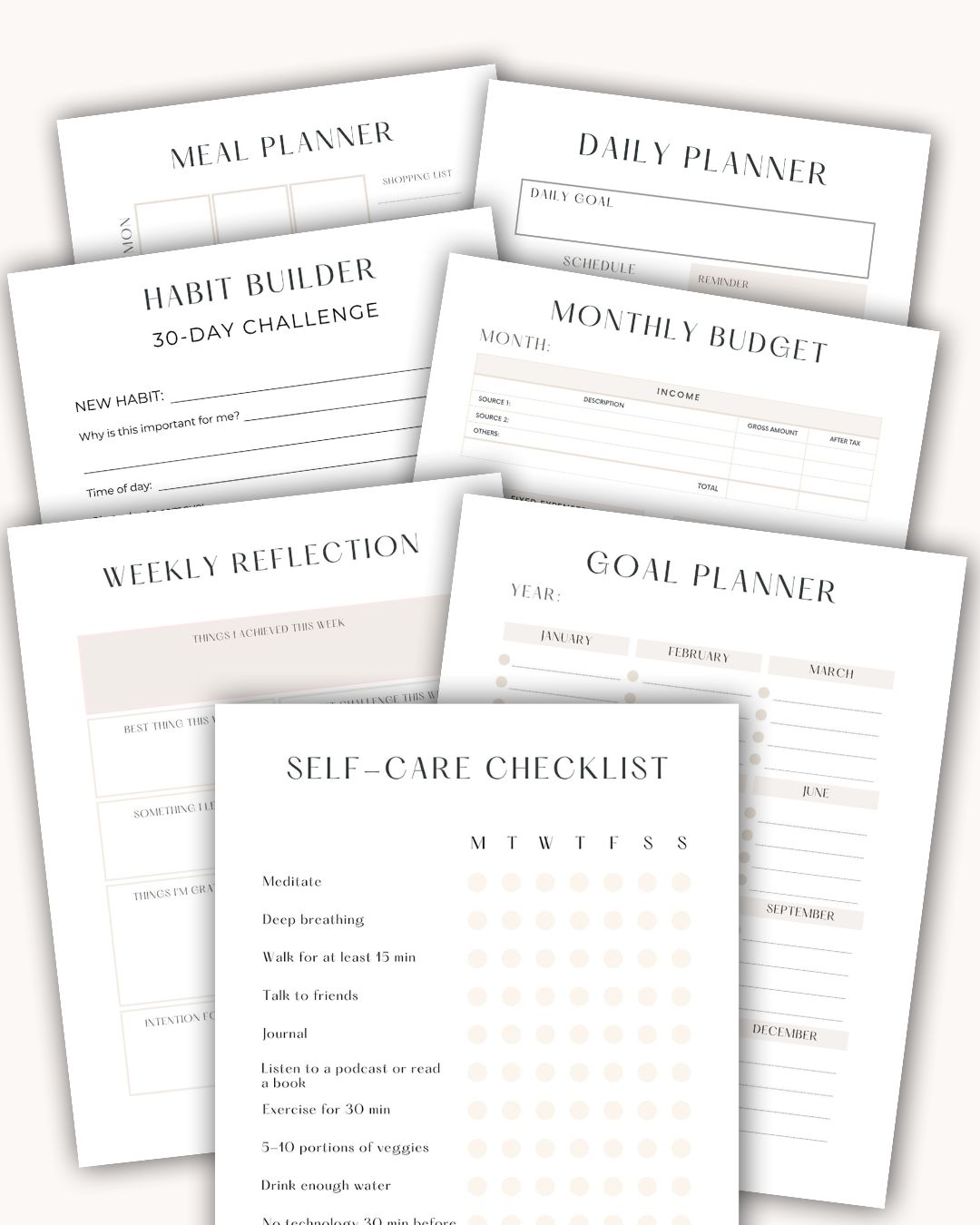One big obstacles keeping us from expressing how we feel is guilt. We might feel selfish or feel bad for making someone else uncomfortable. Here’s how to become free of guilt when communicating hurt feelings to someone we love.
This post contains affiliate links. It means that if you click and make a purchase I might get a commission at no extra cost for you. Read full disclosure here.
Save on Pinterest for later
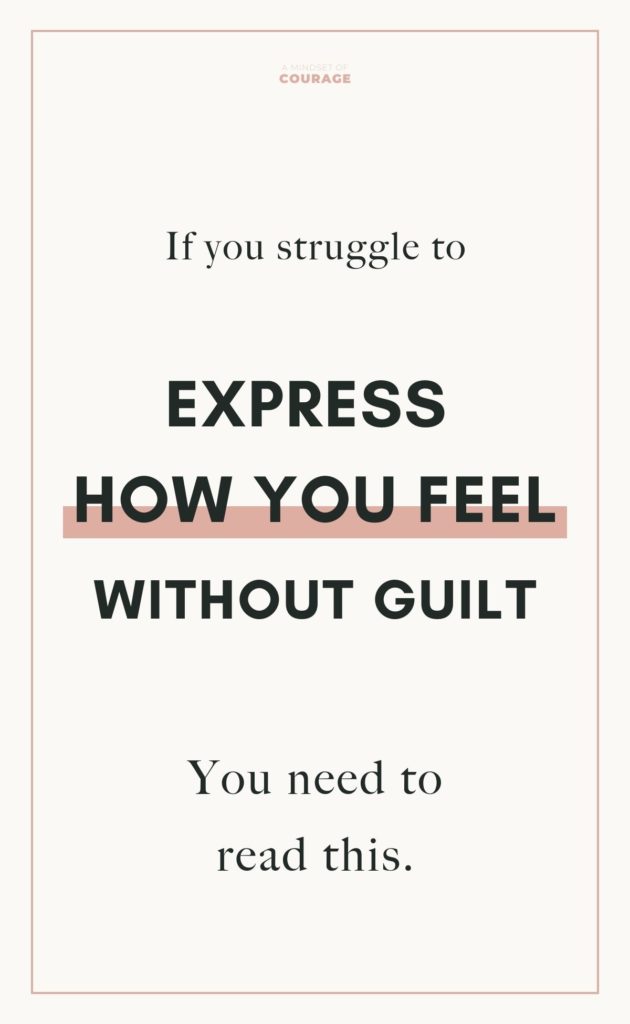
I used to feel guilty for feeling angry at someone. I would tell myself: I don’t have the right to be angry at them, they didn’t mean to hurt me.
Well, that’t not how it works.
Even if people have good intentions, they might hurt us. And if the relationship with them is important to us, we need to communicate how we feel when this happens.
I’ve always been pretty good at being assertive… Except with the people I care about.
With people I barely knew, I wouldn’t have any problem expressing disagreement. However, when it came to people I love, I would NEVER confront them. I would avoid conflict AT.ANY.COST.
Do you tend to avoid conflict? This post might help:
> Why You Avoid Conflict (Even When You Shouldn’t)
I couldn’t bear the discomfort of making someone else feel bad. So I would rather feel bad myself than speak up to feel better. Even for small details. I would keep everything to myself… bottled in.
Believe me, I had a lot of stomach pain at the time.
The exact moment I knew I became free of guilt
A few year ago, I was reading a book and I suddenly had a breakthrough. I already knew about myself that I felt guilty easily. But reading that book made me realize that I felt guilty even for… having feelings.
As if I could control what emotions emerged from me… well, no Marie, you can’t.
I will always remember this exact moment when I finally let go of the guilt I held on to.
OK so now I know you want to know what the book is. It’s called Letting go, by David R. Hawkins. You can buy it on Amazon by clicking here.
Guilt used to be a recurring theme in my life. For so many years. 31 to be precise. Letting go of guilt might seem to have happened overnight, but it took me years of self discovery to get to that point.
The breakthrough was the tipping point of all my learnings about myself. Big transformations are always the result of a compound effect of a reccurring habit.
Are you on a self-discovery journey? These posts might help:
> Why Is It Important To Know Yourself Better To Live Happier
> 24 Personality Development Questions For When You Feel Lost
I wrote this post to fast track the process for you. Especially when it comes to expressing hard emotions to someone you love.
Why you NEED to stop feeling guilty: their feelings are not your fault
First, here’s why you might feel guilty: you believe that you’re responsible for other people’s emotions.
While it might be true that by expressing your feelings, people will get upset, it’s not your fault.
Unfortunately, you cannot control how other people feel. You can save people from their emotion. I repeat.
You cannot save people from their emotions.
Stop trying to be a saviour. Especially at your expense.
You might be responsible for triggering emotions inside of someone. That’s okay. But you’re not responsible for managing or coping with these emotions.
When you avoid to say how you feel, you’re taking responsibility for managing their emotions. You’re trying to no having them feel bad emotions in the first place.
Well, that’s not yours to decide.
If you want to be free of guilt, here’s the first thing to remember: If someone hurt you, or disappointed you, THEY made YOU feel bad in the first place.
Even if that was not their intention. I repeat. EVEN if that was not their intention.
If you tend to feel bad for making people feel bad; that’s probably because you understand that they don’t have a bad intention. Therefore, that they don’t DESERVE to feel bad for what they did.
Well girl, YOU don’t deserve to feel bad either.
To become free of guilt, change your mindset
To become free of guilt, you need to change your mindset. You need to stop giving excuses to people based on their good intentions. Actions are what matter.
Besides, if someone has good intentions toward you, they WANT you to tell them how they hurt you. They want you to tell them how you feel. They will try and understand you, and apologize. As simple as that.
It is very important to understand the difference between one’s intentions and their actions. I can have the best intentions in the world, if I did something to hurt you, I’m going to have to change.
If you avoid to say how you feel, you will save them from having uncomfortable feelings. Avoiding discomfort might make you feel a bit better on the short term. However, it won’t solve your problem, which will inevitably come back. Whether it happens with the same person or someone else.
K. Now you understand the stakes for you. I’m going to tell you why avoiding to express your feelings is actually NOT helping them.
You might tend to feel bad for making other people feel bad. That’s okay, you’re empathetic. But don’t make it your curse.
Use your empathy to show people you understand how they feel. Not to try and save them from their emotions.
Why you need to stop avoiding confrontation
Avoiding confrontation is not helping you because while you might be free of guilt, you’re stuck with disappointment. And over time, disappointment can turn into resentment.
SO. Let’s talk about why avoiding confrontation is not helping the ones you love.
If you don’t say how you feel, people will never KNOW how you feel.
Which means they might never realize they hurt you in the first place. Which means they’re not going to change. And that they will hurt you again.
K but why is what I’m saying about them?
Look at it this way. By not saying how you feel, you’re keeping them from knowing how they can better love you. You’re leaving them unaware of the unhealthy behaviours they have. By doing so, you’re keeping from them an opportunity to improve themselves. To change for the better.
Now, imagine the roles are reversed. Would you want someone not to tell you when you hurt them? I don’t think so. I think you would want to know. You would want to know so you can change, so you can improve yourself and become a better friend, lover or family member.
So bottom line. While you think you’re saving your loved one by not expressing how you feel, you’re actually keeping them from evolving.
How to become free of guilt when expressing speaking up for yourself in relationships
1. Actionable tips – what to do when you feel triggered
When we feel triggered, it usually happens very fast. We might feel agitated, annoyed, irritated, disappointed, offended, or have any other uncomfortable feeling.
You need to recognize your signs first.
So ask yourself right now how being triggered feels in your body and how it manifests physically. For me, it can feel like a intense feeling of heat in my stomach. It manifests with agitation or, at the opposite, total freeze.
Now, when you recognize those signs, use these tips:
1. Pause
Being triggered might piss you off. It is absolutely not a good idea to try and express yourself when your feeling this way. Neither is it a good idea to try and express yourself if you’re frozen.
If you can’t think straight; you won’t be able to express yourself clearly.
So, whatever you’re doing, take a moment to pause. Even if it feels uncomfortable. Stop yourself from wanting to feel the void or break a silence.
2. Breathe
I know it sounds simple.
But it will actually calm yourself down almost immediately. Being triggered makes our brain runs a thousand miles per hour Therefore, we disconnect from the present.
Breathing slowly and deeply will make you come back to earth. Then you will be able to think clearly about what you should or shouldn’t say.
3. Take a distance
When you feel triggered, distance yourself from the person who hurt you.
Disconnect.
Allow yourself to take some distance, so you can think clearly. If you get a triggering text message put down your phone before replying. Go do something else. Whatever it is.
If someone says something to your face, excuse yourself, and walk away. Go to the bathroom. Allow yourself to reconnect.
SO. Following the tips above:
The key to express hurt feelings is not WHAT we say, but HOW we say it. You can be super clear about why you feel mad, but if you scream, no one will hear you. Hence the necessity to calm yourself down before even thinking of saying something.
2. Overcoming your fear of conflict despite your guilt
Read this scenario:
You show up with the intention of expressing something. Then, when the person is in front of you, you change your mind. You tell yourself, “that was not that important”. And you keep it to yourself and “forget about it”.
Sounds familiar? You’re not alone.
It’s hard for everyone to express disappointment. Or any other hard feeling. We can have the best intentions in the world to express ourselves, but if we can’t tolerate the uncomfortable conversation, we give up.
The most important thing to realize is that you won’t suddenly be free of guilt without effort. You WILL have to get out of your comfort zone.
And I hate to break it to you but…it’s actually quite the opposite. You will have to ALLOW yourself to feel guilty so you can let it go. You might have to practise many times. But you will for sure realize that feeling guilty is not as bad as you thought.
Guilt is just a feeling. And like any other feeling, it goes away. But you need to be willing to sit with the feeling for a while, and let it go. That’s how you become free of guilt… over time.
So, the key to succeeding in becoming free of guilt when you express yourself is being willing to sit with discomfort. You will have to actually FEEL guilty first. But then, you need to let it go.
K girl, now is the time to stop holding on to your guilt.
3. How to speak up despite the guilt
Ok so. So far I didn’t really tell you how to be free of guilt or express yourself.
I just told you that you had to feel guilty… well duh. I know, I know, you already feel guilty…
So while it’s helpful to know you have to feel guilty to be free of guilt, it might not be what you wanted to hear.
Again, I promise over time you’ll become very good at coping with the feeling of guilt. Until the day you become totally free of guilt (yes, it happens I promise. I’ve been there).
How to structure your speech:
So, here’s a template to communicate CLEARLY and be straight to the point. First, answer to those 3 short questions:
- What’s the situation?
- How do you feel about it?
- What needs to change?
You can then use that template to structure your speech:
When [1. what’s the situation] happened, it makes me feel [2. how it made you feel]. In the future, I would appreciate if [3.change that needs to happen].
or
[1. Situation] is happening and it makes me feel [2. feelings]. In the future, I would appreciate if [3. change that needs to happen].
OH and I almost forgot: don’t apologize for how you feel. Ever.
Need more tips on communicating with guilt? These blog posts might help:
> How To Say No With Confidence and Freedom From Guilt
4. Actionable tips to cope with guilt
1. Journaling
Journaling helps to get your thoughts in order and actually express your feelings.
Therefore, you can journal to get clear on what and how you’re going to express your feelings. But you can also use journaling to cope with guilt AFTER you have expressed yourself.
After an interaction that made you feel guilty, journal about it. Let everything out.
New to journaling? This blog post might help:
> Journaling Prompts For Beginners: How and What to Write
2. Rehearsing
If you’re not used to express yourself, get in front of a mirror and practise with yourself.
The more you rehearse, the clearer you’re going to get on what you really want to express. It might not wash away all the guilt, it will help you to keep your thoughts aligned when guilt will creep in (you know when you feel like disappearing under the carpet).
3. Vulnerability
One of the easiest way to communicate clearly is to opening up about how speaking up makes you feel.
One of the things that’s helped me the most is being totally honest about how hard for me it is to express myself.
So, why don’t you just say it upfront? It will actually engage the other person in helping you communicate your feelings. Also, there’s no point pretending it’s easy for you. If you do, you will only look like you don’t care. Which couldn’t be further from the truth. And believe me, that’s the last thing you want to do to get a positive reaction.
4. Call a friend
Call someone who’s available to hear you vent.
Talking about it will help. And your friend will give support and reassure you. They’ll help you realize that you did the right thing. It might make you feel better instantly.
5. Move
Exercising is a very efficient way to let energy out.
Whether you go for a 20-minute walk or go all out in a gym session, not only your mind will feel better but your body as well. And just the fact to change environment will help by itself.
One last thing… What if you can be free of guilt with this ONE person only?
You might feel like you’re in a relationship (or friendship) where there’s no space to express how you feel. #toxic
Well first, you’ll have to test that theory. Have you even tried to communicate clearly? Try using the template I shared above and see what happens.
Now if you’re constantly being blamed for how you feel, that’s different. If you have clear evidence that you can’t be free of guilt with that person, it might be time to reevaluate your relationship.
Think you might be in a toxic friendship? This blog post might help:
> How to Deal With Guilt in Toxic Frienships
Conclusion
Becoming free of guilt doesn’t happen overnight. It takes time and practise. But just the fact that you’re here means you’ve already made the first (and most important step): awareness. We can’t change what we’re not aware of. For more tips on overcoming guilt, read the related posts below.
Related blog posts:
> 10 Easy Affirmations for Expressing Boundaries Without Guilt
Save on Pinterest
